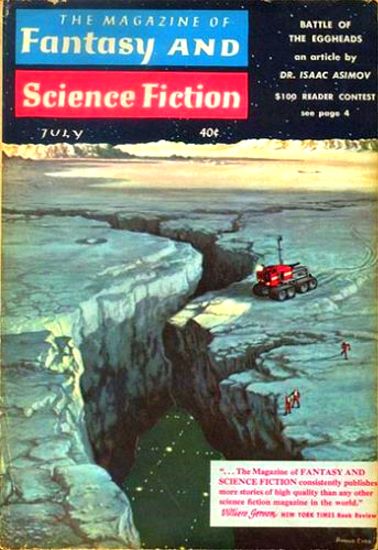
It's those haunting, evocatively written F&SF stories that keep me a regular subscriber. July's issue opens with Robert F. Young's To Fell a Tree, about the murder (mercy killing?) of the tallest tree imaginable, and the dryad that lived within. It'll stay with you long after you turn the last page, this sad, but not entirely desolate, tale. So far, it's the best I've seen by Young.
Asimov's column, this month, is a screed against the snobbery of the champions of liberal arts and humanities to the practitioners of science. I'm told that the rivalry is largely good-natured, but Dr. Asimov seems to have been personally slighted, and his article is full of invective.
Avram Davidson's Author, Author is next: venerable British mystery writer is ensnared by the very butlers and baronets who were the subjects of his novels. I found most interesting the interchange between the author and his publisher, in which the latter fairly disowns the former for sticking to a stodgy old format, the country-house murder, rather than filling pages with sex and scandal. I found this particularly ironic as my wife is a mysteries fan who appreciates whodunnits of an older vintage, from Conan Doyle to Sayers. She has, of late, become disenchanted with the latest, more cynical crop of mysteries. I suspect she would have words for the publisher in Davidson's story.
For Sale, Reasonable is a short space-filler by Elizabeth Mann Borgese about a fellow soliciting work in a world where automation has made human labor obsolete. Damon Knight's following book review column is devoted to The Science Fiction Novel, Imagination and Social Criticism, a book of essays written by some of the field's foremost authors. It sounds like a worthy read.
Jane Roberts' Impasse hits close to home–a young lady loses her last living relative, her grandfather. So great is her grief that, by an act of will, she returns him to life, though the old man is not too happy about it. The story struck a chord with me as I lost my family when I was quite young, and I can certainly identify with the poor girl's plight.
The Harley Helix is another fill-in-the-space short short by Lou Tabakow, the moral of which is There Ain't No Such Thing as a Free Lunch (i.e. the First Law of Thermodynamics). Success Story, which I reviewed last time, is next.
Raymond E. Banks has the penultimate tale, with Rabbits to the Moon, a thoroughly nonsensical tale about the teleportation of creatures (including humans). Its only flaw, that the transported arrive without a skeleton, is made into a selling point.
Last up is The Cold, Cold Box by Howard Fast. The richest man in the world becomes afflicted with terminal cancer and has himself frozen in 1959 so that the future can cure him. But the members of his company's board of directors have a different agenda, particularly after they become the world's de facto controlling oligarchy.
It's good reading all the way through, but it's the lead novella that really sells it. 3.5 stars, I'd say.
I'm off to the movies tonight, so expect a film review soon!
(Confused? Click here for an explanation as to what's really going on)
This entry was originally posted at Dreamwidth, where it has comments. Please comment here or there.
